Spiracles - Study guides, Class notes & Summaries
Looking for the best study guides, study notes and summaries about Spiracles? On this page you'll find 90 study documents about Spiracles.
Page 3 out of 90 results
Sort by
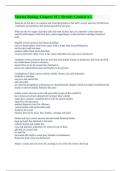
-
Marine Biology Chapter 10 || Already Graded A+.
- Exam (elaborations) • 6 pages • 2024
-
- $10.19
- + learn more
What do all fish have in common and what did primitive fish lack? correct answers All fish have vertebrates and primitive fish lacked paired fins and jaws What are the two types of jawless fish and what do they have in common? correct answers hagfish and lampreys both lack jaws, paired appendages, scales and have cartilage instead of bone Hagfish correct answers are bottom dwelling has two dental plates with horny cusps with a single fang for grabbing prey eat live prey and scavenge pro...

-
PNB 2250 Exam 3 Questions and Correct Answers | Latest Update
- Exam (elaborations) • 58 pages • 2024
- Available in package deal
-
- $13.49
- + learn more
Examples of respiratory structures of terrestrial animals -:- bulk flow with tracheal system and spiracles (insects), cutaneous (frog) Examples of respiratory structures of aquatic animals -:- bulk flow (sponges, cnidarians), gills, water vascular system, arborescent respiratory trees (sea cucumber), cutaneous (leech) Do all aquatic animals necessarily exchange gasses in water? -:- No, some aquatic animals could exchange gasses above water using lungs, like aquatic mammals, or cuta...
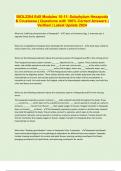
-
BIOL2204 EdX Modules 10-11: Subphylum Hexapoda & Crustacea | Questions with 100% Correct Answers | Verified | Latest Update 2024
- Exam (elaborations) • 6 pages • 2023
-
- $8.49
- + learn more
What are 3 defining characteristics of Hexapoda? - 3 pairs of uniramous legs, 1 antennae pair, 3 tagmata (head, thorax, abdomen) What are 2 adaptations Hexapoda have developed for terrestrial existence? - A hard waxy cuticle to reduce water loss, and excretory and respiratory systems to preserve moisture. Write out the following statement about the excretory system of Hexapoda and fill in the missing terms: The Hexapoda excretory system contains ___ ___ attached to the ___ system. These tub...
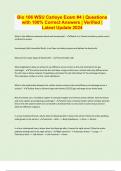
-
Bio 106 WSU Carloye Exam #4 | Questions with 100% Correct Answers | Verified | Latest Update 2024
- Exam (elaborations) • 6 pages • 2024
- Available in package deal
-
- $7.99
- + learn more
What is the difference between blood and hemolymph? - Blood: In a Closed circulatory system and is confined to vessels. Hemolymph (AKA interstitial fluid): In an Open circulatory system and bathes the body cells. What are the major types of blood cells? - red and white cells What adaptations allow an animal to use diffusion across its skin as the only mechanism for gas exchange? - The animal must be thin and have a large surface area. Animals that only diffuse across the skin have a dense ...

-
AQA AS BIOLOGY 7401 EXAM WITH QUESTIONS AND CORRECT VERIFIED ANSWERS LATEST UPDATE.// Biology AS AQA What are the advantages of multi-cellular organisms? - CORRECT ANSW--able to move -able to hunt(likely to he in top
- Exam (elaborations) • 37 pages • 2024
- Available in package deal
-
- $11.49
- + learn more
AQA AS BIOLOGY 7401 EXAM WITH QUESTIONS AND CORRECT VERIFIED ANSWERS LATEST UPDATE.// Biology AS AQA What are the advantages of multi-cellular organisms? - CORRECT ANSW--able to move -able to hunt(likely to he in top if food chain) -able to adapt to environment -specialised body reigons -able to find a mate What are the disadvantages of multi-cellular organisms? - CORRECT ANSW-As they get bigger diffusion is less efficient and specia...
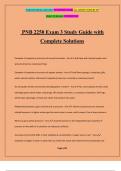
-
PNB 2250 Exam 3 Study Guide with Complete Solutions
- Exam (elaborations) • 43 pages • 2024
- Available in package deal
-
- $12.49
- + learn more
©GRACEAMELIA 2024/2025 ACADEMIC YEAR. ALL RIGHTS RESERVED FIRST PUBLISH OCTOBER 2024 Page 3/43 Name one aquatic and one terrestrial animal that has the opposite physiological setup: one that lacks a circulatory system (at least one used primarily for gas exchange) and respires using bulk flow of the medium (water or air) - Ans:-Bulk flow animals have no circulatory system Aquatic: sponge, cnidarian Terrestrial: insect (tracheal system and spiracles) Name an aquatic and terrestrial anima...
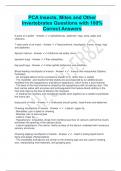
-
PCA Insects, Mites and Other Invertebrates Questions with 100% Correct Answers
- Exam (elaborations) • 22 pages • 2024
- Available in package deal
-
- $12.99
- + learn more
PCA Insects, Mites and Other Invertebrates Questions with 100% Correct Answers 6 parts of a spider - Answer cephalothorax, abdomen, legs, eyes, palps and chelicera. 7 main parts of an insect - Answer head,antenna, mouthparts, thorax, wings, legs and abdomen. Aphytis melinus - Answer California red scale( citrus. assassin bugs - Answer flies caterpillars. big eyed bugs - Answer mites aphids bollworms and whiteflies. Blood-feeding mouthparts of insects - Answer - Insects like m...
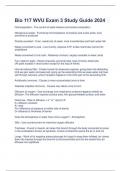
-
Bio 117 WVU Exam 3 Study Guide 2024
- Exam (elaborations) • 5 pages • 2024
- Available in package deal
-
- $10.99
- + learn more
Osmoregulation - The control of water balance and solute composition Nitrogenous waste - Formed by the breakdown of proteins and nuclei acids, toxic ammonia is produced Directly excreted - Toxic, needs lots of water, most invertebrates and fresh water fish Waste converted to urea - Low toxicity, requires ATP, turtles mammals marine fish amphibians Waste converted to Uric acid - Relatively nontoxic, largely insoluble in water, birds Four nephron parts - Renal corpuscle, proximal tu...

-
Bio 106 WSU Carloye Exam #4 Questions and Correct Answers | Latest Update
- Exam (elaborations) • 13 pages • 2024
- Available in package deal
-
- $10.49
- + learn more
What is the difference between blood and hemolymph? -:- Blood: In a Closed circulatory system and is confined to vessels. Hemolymph (AKA interstitial fluid): In an Open circulatory system and bathes the body cells. What are the major types of blood cells? -:- red and white cells What adaptations allow an animal to use diffusion across its skin as the only mechanism for gas exchange? -:- The animal must be thin and have a large surface area. Animals that only diffuse across the ski...
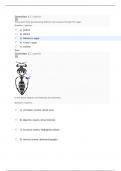
-
ENVS 2210 Introductory Apiculture MidTerm Exam 2023
- Exam (elaborations) • 17 pages • 2023
-
- $9.99
- + learn more
Question 1 (1 point) Honey bees hear by perceiving airborne sound waves through this organ Question 1 options: a) pedicel b) labrum c) Johnston’s organ d) Caron’s organ e) arolium Save Question 2 (1 point) In the above diagram, the following are presented Question 2 options: a) circulatory system, dorsal aorta b) digestive system, dorsal intestine c) excretory system, Malpighian tubules d) nervous system, abdominal ganglia e) respiratory system, air sacs and position of spira...

Did you know that on average a seller on Stuvia earns $82 per month selling study resources? Hmm, hint, hint. Discover all about earning on Stuvia


